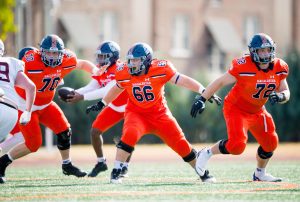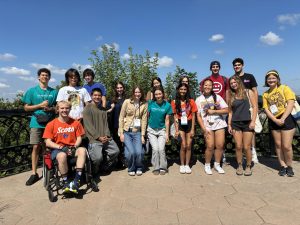Mitau panel on reparations fields unexpected questions

February 11, 2021
On Tuesday, Feb. 9, Dr. William Darity Jr. and A. Kirsten Mullen visited Macalester via Zoom for the first event in a two-part series that will make up the 40th annual Theodore Mitau Lecture. Darity is the Samuel Dubois Cook Distinguished Professor of Public Policy at Duke’s Sanford School of Public Policy. Mullen is a folklorist and the founder of Artefactual, an arts consulting practice, and Carolina Circuit Writers, a consortium that brings writers of color to the Carolinas.
The two lectured on their book “From Here to Equality: Reparations for Black Americans in the Twenty-first Century,” which argues for reparations for Black descendants of enslaved people in the United States and outlines a plan for its implementation.
Darity and Mullen’s approach draws inspiration from past reparations programs, such as reparations Germany paid to Jewish people in the aftermath of the Holocaust. Mullen outlined several key components of a successful movement for reparations, including leadership from impacted communities, pressure both within and outside the formal political system and education on why reparations are appropriate. Mullen specifically noted that popular support for reparations is not always necessary to implement them.
“More than half of all Americans, including nearly 40% of white Americans, indicated support for a commission to develop reparations,” she said. “Reparations for Jewish people post-Holocaust was achieved with less popular support.”
Darity enumerated three crucial aspects of a reparations program: an eligibility requirement, a standard for how much money should be distributed and the inclusion of direct payments. Darity and Mullen’s proposal centers on using the Black-white wealth gap as the standard for how much money should be distributed.
“We focus on the wealth differential because it, in our estimation, best captures the intergenerational effects of white supremacy,” Darity said. “And it captures those effects on living descendants of folks who were enslaved.”
Darity and Mullen propose that the United States government distribute $10 to 12 trillion to descendants of enslaved people over the course of up to ten years.
Following the outline of their research and proposal, Darity and Mullen took questions. Political Science Professor Lesley Lavery read questions from attendees sent through an anonymous chat function.
“Is it morally fair for someone who was never a slave owner to pay someone who was never enslaved?” one attendee asked.
Darity responded that their plan does not involve individual payments and treats the federal government as the responsible party. Mullen directly questioned the anonymous attendee.
“My first question would be: how do you know your family was not involved in slavery? Have you done that research?” Mullen said. “We’ve heard many people, Black and white — mostly white — dramatically underestimate the number of people involved in the slave trade.”
Mullen also pointed out that numerous people not directly involved in slave trade benefitted it in some way, such as shipbuilders, blacksmiths and others.
“All roads led to slavery in this period,” Mullen said. “So before you say, ‘My family had no connection to slavery,’ please, please, do your research.”
Mullen and Darity responded to several questions by pointing out that reparations for Black Americans are often questioned more than other forms of reparations. One attendee asked if reparations recipients would receive counseling on how to responsibly spend and invest their money.
“We are always intrigued by this question,” Mullen said. “Why in the case of Black descendants of U. S. slavery do we feel they need special training? When the 9/11 victims and families received payments no one said ‘Gee, let’s give them financial literacy first.’ Nor was this the case for Jewish victims of the Holocaust. Somehow Black Americans are the only people who need this training.”
Darity responded similarly to a question that asked if wealthy Black Americans, such as Oprah Winfrey, should have access to reparations.
“Again, this is one of those questions that’s raised about Black American reparations,” Darity said. “I didn’t hear anyone ask if Holocaust victims who are millionaries or billionaires should receive reparations. I didn’t hear that question about Japanese-Americans who were incarcerated. Reparations is not an antipoverty program. It is a debt that is owed.”
American Studies major Andrew Lee ’23 left the event appreciative of Darity and Mullen’s presentation, and felt Mullen’s contextualization of reparations was particularly valuable.
“It is easy to think that a program like reparations would be too costly or unfavorable,” Lee wrote in an email to The Mac Weekly. “By providing other instances where reparations had been given, the conversation was made much more realistic.” However, Lee was disappointed in the questions put forward by attendees.
“it seemed that many community members came into the lecture defensive, ignored what was being said by Ms. Mullen and Dr. Darity, and then asked questions that were contrarian and disrespectful of their time,” Lee wrote. He added that anti-Blackness may have played a role in the questions.
“I doubt some of the questions would have been so aggressive had he panelists been white,” he wrote. “At the end of the event, I really just felt embarrassed to be a part of the community.
Lavery said the anonymity of questions was not an intentional choice, but the result of the technology the department used to host the event. Due to the high volume of questions, staff members monitored incoming questions and sent them to Lavery to read out loud, so she could focus on facilitating the conversation.
“There was no particular rationale for anonymity,” Lavery wrote in an email to The Mac Weekly. “Rather, we had to work as a team to get in as many questions as we could.”
Lavery also noted that alumni from various departments were invited to the event, which was also advertised on social media, so not all of the questions came from students.
The second event in this year’s Mitau Lecture series will feature Professor Tiffany Willoughby-Herard, associate professor of African American studies at the University of California-Irvine. The lecture, “‘I’m really sorry about what happened to you but, you’re not one of us, you’re a foreigner’: A history of Afrophobia in contemporary South Africa” will be held on March 29.











